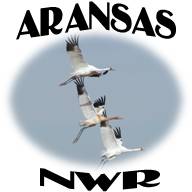The Arkansas Project passes critical stage in Endangered Species Act litigation to protect Whooping Crane
(Corpus Christi, TX — July 28, 2010)
Today, in the federal Endangered Species Act (ESA) litigation brought by The Aransas Project (TAP) against officials of the Texas Commission on Environmental Quality (TCEQ), United States District Judge Janis Jack ruled from the bench to deny all motions to dismiss the litigation.
Proceeding issue-by-issue, Judge Jack entertained arguments from all parties before ruling from the bench to deny each of the motions brought by the defendants and intervenors urging the court to dismiss the case or abstain from hearing it. The ruling clears the path for the litigation to proceed on the fate of the whooping crane, an internationally-recognized endangered species.
TAP legal counsel Jim Blackburn explains, “TAP’s litigation overcame a major hurdle in surviving motions brought by TCEQ and various intervenors.” This significant development in the case followed an approximately 90-minute hearing before the United States District Court for the Southern District of Texas, Corpus Christi Division. Over the course of the hearing, the Office of the Attorney General, flanked by lawyers for intervenors Guadalupe-Blanco River Authority (GBRA) and the Texas Chemical Council (TCC), advanced various arguments seeking to secure the dismissal of TAP’s case as well as urging the court to abstain from hearing the case on grounds that it would interfere with the state’s regulation of its’ water resources.
Following the hearing, TAP legal counsel Jim Blackburn commented, “We are pleased that the Court agreed that our case should move forward. In a case with international implications, this is a significant step in TAP’s efforts to protect this magnificent endangered species.” Blackburn continued, “We are now looking forward to commencing discovery, and digging deeply into the scientific merits which will be central to this case.”
The case is currently set for trial on March 2, 2011.
Background
In March 2010, TAP filed a federal lawsuit against several officials of TCEQ in their official capacities for illegal harm and harassment of Whooping Cranes at and adjacent to Aransas National Wildlife Refuge in violation of the Endangered Species Act. TAP seeks a process to ensure that the Crane’s habitat and food sources in the bays and estuaries are protected during times of low flows.
The Aransas-Wood Buffalo flock of Whooping Cranes that winters on the Texas coast is the only natural wild flock remaining in the world. The flock has increased from 16 birds in the early 1940s to a high of 270 in the spring of 2008. The 2008-2009 year was the worst in recent history for the Whooping Crane, with a death toll of 23 birds, or 8.5% of the flock, occurring in Texas during their winter at Aransas. The lack of freshwater inflows to the bays from the Guadalupe and San Antonio Rivers, especially during times of low flows, resulted in very high salinity levels and depleted food and water sources for the Cranes.
About The Aransas Project
The Aransas Project is a 501(c)(3) non-profit organization focused on water management of the Guadalupe River Basin and bays that represents all interests throughout the basin—all the way to the bay. TAP is an alliance of municipalities, businesses, organizations, and citizens working to ensure freshwater flows to the bays and estuaries that protect the winter habitat of the endangered whooping crane. TAP’s focus has brought together a diverse range of groups, unifying an unlikely mix of both conservative and liberal support around this critical issue. Members include Aransas County, Aransas County Navigation District, Town of Fulton, City of Rockport, International Crane Foundation, the Coastal Bend Guides Association and more.

